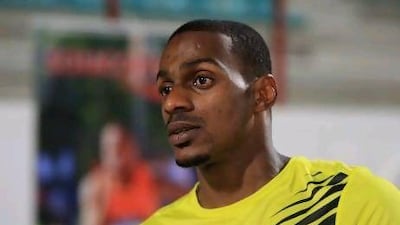Mohammed Abbas Darwish, the triple jumper who is the UAE's best chance of an automatic qualifier in athletics for the London Olympics, is a tough nut to crack.
With the burden of expectation weighing heavy on an athlete who is so far ahead of the field in this country that he won his event at the President's Cup at the weekend off just a five-pace run-up, he is not a fan of chat. "I like quiet," the Emirati jumper says.
He does not even like giving interviews in his native tongue, so having to answer questions in English ("You speak too fast") only prompts a new level of reticence.
What about a little common ground, then. Jonathan Edwards? Judging by his reaction, they are his two favourite English words.
"Oh, he is the best player!" Darwish, 26, says, suddenly swapping wary truculence for a beaming smile. "He is amazing. I watch him all the time. Even now in training I try to make my technique just like him.
"I have DVDs of him and look on the internet all the time. Eighteen twenty-nine."
For a moment he ponders the number that marks the triple jump world record, set by Edwards in winning gold for Great Britain at the World Championships in Gothenburg in 1995.
For the next six weeks or so, however, the only digits he really cares about are 16.85 - the qualifying B-standard for the Games.
Attaining it would secure his passage to the Olympics, but it is five centimetres further than he has ever jumped.
Between now and the July 8 cut-off, he has a grand tour planned when he will be chasing the distance.
He has approximately four chances left, with trips scheduled to IAAF-approved competitions in Bulgaria, France, the UK and Morocco.
The clock is ticking.
"Whenever I watched it on the TV, I always wanted to be there," he says of the Games.
"That is still my wish, but I want to do it by getting the standard, not with a wild card."
At the time of the last Olympics, in Beijing, Darwish was still pursuing the high jump and pole vault, disciplines in which he holds national records.
He was prompted to switch to the triple jump at the suggestion of Svetoslav Topuzov, the coach recruited three and a half years ago by the Athletics Federation.
The Bulgarian knows a thing or two about it, having overseen the rise of Tereza Marinova to the top of the podium in the women's event at the 2000 Sydney Olympics.
While acknowledging Darwish's raw talent, Topuzov concedes his charge is behind schedule in a sport which takes "five or six years" to hone the requisite - Edwards-templated - technique.
"Everybody expects strong results in a short space of time," the coach says. "Because of that everybody makes pressure: give results, give results, give results.
"But this is not good for the player. They need to take it easy, prepare slowly, slowly and grow towards the results."
It is something of a surprise that Darwish took so long - until the age of 22 - to realise his true athletic vocation, but he has never been short of options.
Along with the national records he holds in three jumping disciplines, he has competed for the UAE in the 110-metres hurdles, and has a best of 21.12 seconds in the 200m.
Away from the runway, he occasionally gets in the boxing ring to spar with one of his five brothers.
He is also driven by the national obsession, football, and all the more since Al Wasl, his athletics employers, acquired the services of a certain Argentine.
"I play football on the beach all the time," Darwish says. "And I see Diego Maradona at training every day.
"He is with the footballers on the pitch, and I am next to them on the track."
It has not escaped him that, as one of six boys and with three sisters, too, the Darwish squad are better suited to team sports. "With our father and mother as well, we have a team for football," he says.
That is quite a few people he needs to please, even before you get to the hopes of the rest of the Emirati public.
He might be feeling the glare of expectations, but the national Athletics Federation are glad to have him.
"It is normal that he should feel the pressure," says Ahmed Al Kamali, the president of the UAE Athletics Federation. "Even the best athletes around the world feel that way."
Follow us


